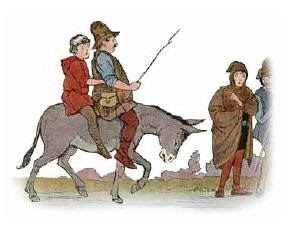The Miller, his Son and their Ass
One day, a long time ago, an old Miller and his Son were on their way to market with an Ass which they hoped to sell. They drove him very slowly, for they thought they would have a better chance to sell him if they kept him in good condition. As they walked along the highway some travellers laughed loudly at them.
“What foolishness,” cried one, “to walk when they might as well ride. The most stupid of the three is not the one you would expect it to be.”
The Miller did not like to be laughed at, so he told his son to climb up and ride.
They had gone a little farther along the road, when three merchants passed by.
“Oho, what have we here?” they cried. “Respect old age, young man! Get down, and let the old man ride.”
Though the Miller was not tired, he made the boy get down and climbed up himself to ride, just to please the Merchants.
At the next turnstile they overtook some women carrying market baskets loaded with vegetables and other things to sell.
“Look at the old fool,” exclaimed one of them. “Perched on the Ass, while that poor boy has to walk.”
The Miller felt a bit vexed, but to be agreeable he told the Boy to climb up behind him.
They had no sooner started out again than a loud shout went up from another company of people on the road.
“What a crime,” cried one, “to load up a poor dumb beast like that! They look more able to carry the poor creature, than he to carry them.”
“They must be on their way to sell the poor thing’s hide,” said another.
The Miller and his Son quickly scrambled down, and a short time later, the market place was thrown into an uproar as the two came along carrying the Donkey slung from a pole. A great crowd of people ran out to get a closer look at the strange sight.
The poor Miller now set out sadly for home.
By trying to please everybody, he had pleased nobody, and lost his Ass besides.
Moral
If you try to please all, you please none.
_________________
Aesop's Fables are credited to Aesop, a slave and storyteller believed to have lived in ancient Greece between 620 and 564 BCE.
2.500 years later, singer and once teen-idol Ricky Nelson said much the same in a hit song. The 1972 song, written by him, is called “Garden Party” and tells the story of Nelson being booed at a concert at Madison Square Garden. It was Nelson's last Top 40 hit, reaching 6 on the U.S. Billboard charts.
Hear the sing by clicking on:
Some trivia:
A 1971 concert at Madison Square Garden in New York City (the garden party referred to) included many greats of the early rock era, including Chuck Berry, Bo Diddley, and Bobby Rydell.
When it was Nelson’s turn on stage, he was dressed in the then-current fashion, wearing bell-bottoms and a purple velvet shirt, with his hair hanging down to his shoulders. He started playing his older songs like "Hello Mary Lou", but then he played the Rolling Stones' "Country Honk" (a country version of their hit song "Honky Tonk Women") and the crowd began to boo.
Some reports say that the booing was caused by police action in the back of the audience.
Nelson thought it was directed at him, sang another song and then left the building, failing to appear onstage for the finale.
The lyrics contain the lines:
When I sang a song about a honky-tonk, it was time to leaveIf you gotta play at garden parties, I wish you a lotta luckBut if memories were all I sang, I rather drive a truck.
The last words are a reference to Elvis Presley, who worked for a time as a truck driver. Elvis was famously told after several failed auditions to "stick to truck driving because you're never going to make it as a singer"
What does that have to do with Aesop?
The repeated chorus in Nelson's song is:
But it's all right now, I've learned my lesson well
You see, you can't please everyone, so you've got to please yourself






No comments:
Post a Comment
Note: Only a member of this blog may post a comment.